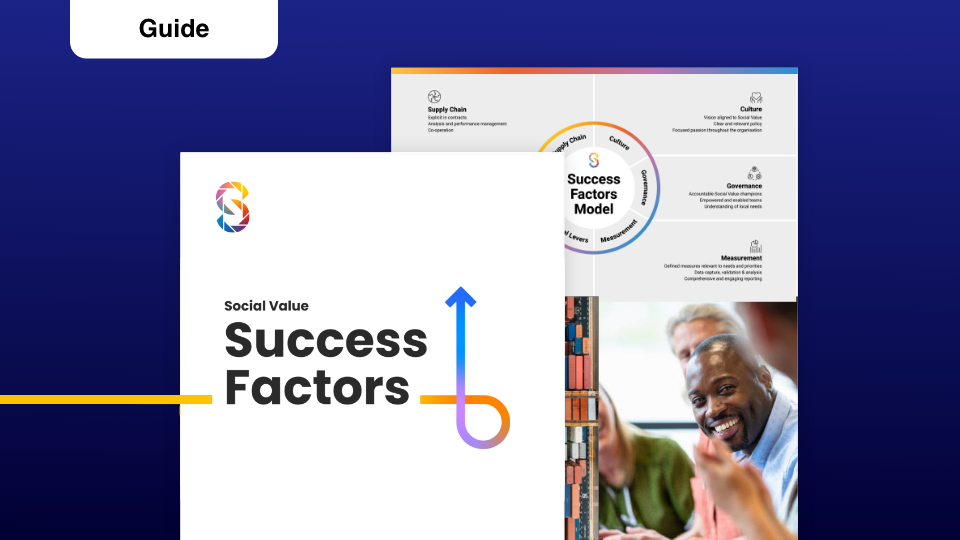All organisations have a responsibility to help create a prosperous future, flourishing communities, and a thriving planet. With an effective Social Value strategy, you can meet this responsibility - and prove that you are doing so.
But what does an effective Social Value strategy look like?
Social Value Portal has created a dedicated Social Value Success Factors model, underpinned by our years of experience supporting our members, and our recent survey of 700+ Social Value stakeholders.
Our Success Factors Toolkit deep dives into this model - here, we provide a snapshot.
Why Social Value matters for everyone
Over the past decade, a series of legislative steps have embedded Social Value into UK procurement. It’s no surprise, then, that Social Value is already a strategic priority for many organisations.
A substantial 76% of our respondents said Social Value was very or extremely important. Large proportions also said it was critical for specific functions, including:
- Compliance
- Competitive advantage
- Staff engagement
- Attracting investors
- Winning bids
Social Value isn't just a ‘flash in the pan’. In fact, 82% of our respondents expect their organisations to spend more time supporting Social Value over the coming three years.
Using the Social Value Success Factors Model
So, what underpins a successful Social Value strategy? Our Social Value Success Factors Model brings together the six key, interrelated components:

The Social Value Success Factors Model
With a focus on these Social Value Success Factors, you will be able to get your journey off on the right track. Here’s how each one contributes to a holistic strategy:

Creating a Social Value culture means educating and gaining widespread buy-in across your entire organisation, reshaping its ways of working.
Of course, this entails a mindset shift: embracing a broader definition of value, one which encompasses benefits to people, place, and planet.

Strong and consistent governance will provide direction to your Social Value strategy and execution. This is already a big focus for many: 59% of our respondents said they had a Social Value or CSR-focused executive.
But while top-down direction matters, enabling your teams to identify opportunities and show initiative is the next step. This means creating and maintaining engagement, showcasing successes, and promoting opportunities to get involved.

If you want to demonstrate your Social Value successes to your stakeholders, then measuring your activities and their results is a must. It will lend credibility to your strategy and enable continuous improvement.
An important foundational step is to decide which metrics you need to monitor. Your measures should be aligned to a recognised framework, like the Social Value TOM System™, to your organisation’s goals, and to local community needs.

Your levers are the key resources and actions available to you; essentially, the enablers of your Social Value activities and tactics. Different organisations will have different levers, but there are some which are essential across the board.
For instance, collaboration with partner organisations will increase your reach and impact. To get maximal results, it is also necessary to fully activate your workforce and internal resources while driving continuous learning through upskilling and training.

Minimum 10% weightings for Social Value are now mandated in government contracts – and many contracts feature higher weightings. This means that for organisations looking to secure contracts with the public sector, strong Social Value bids are non-negotiable.
Yet our survey found that a quarter of respondents were not confident their organisations could create competitive Social Value bids in response to tenders. Our Win more Bids toolkit outlines ‘6 steps to pro’ for organisations looking for work from the public sector:

Six steps to pro for bidders

Supply chain spend is a massive area of opportunity for Social Value delivery. But our research uncovered significant frustration with the way suppliers and procurers communicate and collaborate: only 25% of respondents said they were satisfied.
Tapping into the full Social Value potential of the procurement space will require suppliers and procurers to work together, prioritising clear communication, constructive feedback, and continuous evaluation.
Start your Social Value journey
With the right commitment to building the essential Social Value foundations and embedding them in the heart of your organisation, successful Social Value delivery is within your reach. Starting from a measured baseline, strive to learn, collaborate, share and continuously improve, and you will drive meaningful results.
Claire Ollington, Customer Success Director, Social Value Portal












